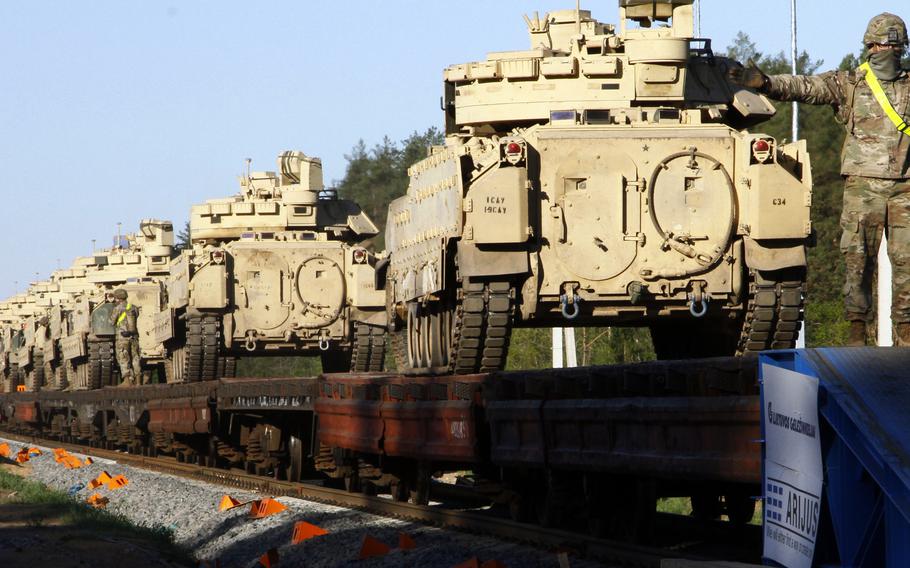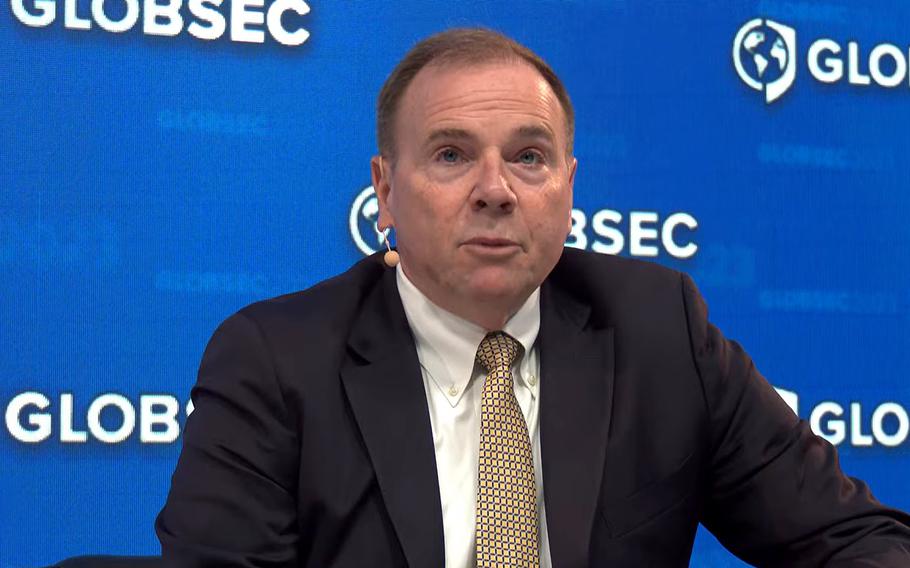
U.S. Army Sgt. Ian Ortiz guides a Bradley Fighting Vehicle onto a rail car in Pazeimene, Lithuania, in 2020. At a security conference in Bratislava, Slovakia, on May 30, 2023, retired Lt. Gen. Ben Hodges, a former U.S. Army Europe commander, said the U.S. and its NATO allies are not ready to defend the Continent in the event of a Russian attack. (Megan Zander/U.S. Army National)
The U.S. and its NATO allies haven’t acted on lessons learned from the war in Ukraine and aren’t prepared enough to defend Europe from a Russian attack, the Army’s former top commander on the Continent told an audience this week at a major security forum.
Transporting troops swiftly to the front lines, producing enough ammunition and communicating with allied armies remain challenges for NATO in defending against Russia, retired Lt. Gen. Ben Hodges, former commander of U.S. Army Europe, said Tuesday at the Globsec conference in Bratislava, Slovakia.
“When I think of where we were when I was a commander, it’s so much better now,” Hodges said. “But we are nowhere near where we have to be if we’re serious about defeating a Russian attack. … And we’re not ready.”
Hodges took the reins of U.S. Army Europe in late 2014 in the wake of Russia’s first invasion of Ukraine, and he served in that role until 2017.
Since the full-scale Russian invasion of Ukraine in February 2022, NATO has been slow to learn the lessons from that war, partly because of persistent bureaucratic obstacles, Hodges said.
“We still cannot move where we have to move fast enough to convey to the Russians that we can move as fast or faster than them,” he said.
Hodges estimated that Germany’s rail cars can move only one-and-a-half brigades and equipment through Europe at a time, far short of the 10 or 12 brigades that he thinks would need to be moved “simultaneously.”

A screenshot of retired Lt. Gen. Ben Hodges, a former commander of U.S. Army Europe, speaking at the Globsec conference in Bratislava, Slovakia, on May 30, 2023. Hodges said the U.S. and its NATO allies have not acted on lessons learned from the Ukraine war and are insufficiently prepared to defend Europe against a Russian attack. (YouTube/Globsec)
Countries supplying Ukraine have complained about persistent ammunition shortages for more than a year, but not much has changed as far as government investments, Hodges said.
“A lot of hand wringing about we need more ammunition, but I’m not seeing gigantic piles of money going into the actual production of ammunition,” Hodges said.
Additionally, NATO battlegroups do not have enough secure communication channels among allied militaries, he said. Russian troops have shown the ability to track signals sent by troops on the battlefield.
“Anybody out there on a phone or a radio that’s not secure, they’re going to get killed in three or four minutes,” Hodges said.
He was part of a panel at the conference that included defense officials from Slovakia and Slovenia. His remarks addressed the future of defending countries on NATO’s eastern flank.
Held annually since 2005, the Globsec forum has become “one of the preeminent global strategic conferences,” according to its website. It has seen prominent European politicians unveil their defense policies in years past.
Speaking Wednesday at the conference, French President Emmanuel Macron called on Europe to do more to support its own arms production.